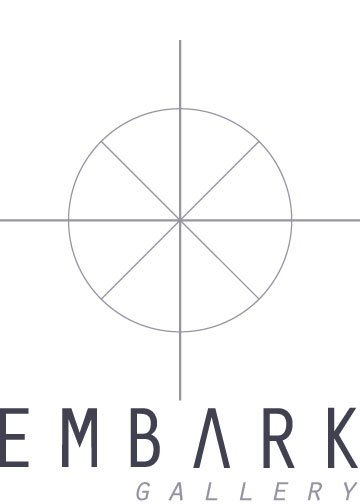Four emerging artists explore contemporary politics of race, culture and citizenship
Christopher Marin. Lift Me Up, 2016-2017. Acrylic on canvas mural.
Though in some ways the world has never been more globalized, a troubling trend of Nationalism is (re)emerging. These four emerging artists from local graduate institutions grapple with issues of race, culture, and citizenship, probing the complicated power structures that sustain our definitions of us (U.S.) vs "Them." Art has always been a useful means through which to understand culture and with Neighbors we are attempting to dissect this fraught political moment by provoking conversations that have the power to shift perspectives. The artists’ thoughtful investigations into these charged and divisive issues ask us to reconsider learned belief systems, dismantle malevolent frameworks of oppression in governance and to remember past political struggles as we strive to achieve a more just and inclusive society.
Christopher Marin (CCA) presents beautifully rendered, mural-sized portraits of Black American history. Shown in an enclosed space, the life-sized paintings envelop the walls and the viewer entirely. An audio track booms throughout the small room, sampling Martin Luther King, Jr., President Obama and other important figures represented in his work. Underlying these snippets of speech is an almost celebratory musical remix of old protest songs and contemporary Hip-Hop, peppered with news stories that revolve around police brutality and Black Lives Matters protests. The jarring juxtaposition is emotional and ultimately hopeful, though past struggles and atrocities are certainly not glossed over. Marin gets at the complex state of contemporary race politics in a society where Black culture is appreciated (often fetishized), appropriated and, ultimately, monetized without the recognition of the systemic and institutional consequences of living in a country built on slavery. Tall light posts in the main gallery stand in for proud brown bodies as Marin’s red portraits take the place of celebratory street banners. Rendered on blue paper, the work reluctantly takes on the colors of police lights and of the American flag.
Shari Paladino. Habitas, 2017. Wood. Installation view.
Amy Nathan (Mills) presents an installation that aims to offer new ways of understanding power structures, ultimately dismantling them. Beginning with a photograph of President Trump in the Oval Office watched over by his chosen presidential portrait of Andrew Jackson, Nathan gathers empirical data and deconstructs the image according to form and color. Following a precise set of invented rules, Nathan remakes the image as a series of silkscreen prints which teeter on a small ledge. Through this process Nathan destroys the inherent performance of the picture and exposes its fallacies, questioning the misuse of “logic” by those in the seats of power. The precarious installation also reminds us of the chaos that could ensue if, or when, our current systems fail.
Shari Paladino (UC Berkeley) will install Habitas, a sculptural performance set for a piece based on the hidden paternity story of her older brother. The script, titled Dark Italian Recipe, consists of mismatched narratives and cut up stories, calling into question the sub-textual narratives of race, heritage, purity, and culture. In the script the term “Dark Italian” comes under scrutiny for for the role it plays in the family’s response to having one mixed race child, and for its peculiar combination of racism and charade. The semi-autobiographical piece is ultimately a critical investigation into self-definition and belonging, and investigates racism in American culture through a lens of nostalgia and personal memories.
Keyvan Shovir (CCA) shows a series of sculptures shaped as military aviation planes and drones, decorated like the spiritual architecture of mosques from his home country of Iran. The vibrant works are titled “Mihrab” after the niche in the wall of mosques that faces towards Mecca. Through this clashing of imagery, the delicate lace cutouts on top shapes that infer violence, Shovir references the community and pride inherent in the Muslim practice of prayer, which continues on even in the face of Islamophobia and warmongering.
This exhibition was juried by Micki Meng of Altman Siegel Gallery and Clea Massiani of Bass & Reiner.
Embark Gallery offers exhibition opportunities to graduate students of the Fine Arts in the San Francisco Bay Area. We provide a space for an engaged community of artists, curators and scholars, and we aim to expand the audience for up and coming contemporary art. The juried exhibitions are held at our gallery in San Francisco at the historic Fort Mason Center for Arts & Culture.
* * * * * * * * * * * * * *
Press Previews by appointment.
Opening Reception: September 22, 2017. 6-9pm
Hours: 12–5pm every Saturday and Sunday, September 23 - October 28
Media Contact: Angelica Jardini, Curatorial Director // angelica@embarkgallery.com


